Inside the UK’s white-collar cage fighting scene – BBC News

SHOCKING VIDEO: “WARNING CRUSOME FOOTAGE” Mentally Challenged Karate Master is Beaten To DEATH By MMA Fighter CLICK HERE TO WATCH http://judoweekly.com/judos-greatest-kos-fight-videos… Like our Page Share THIS VIDEO…
http://www.breakthroughproducts.net/ordericewave.html
http://secretninjanews.com/100-greatest-martial-arts-kos-fight-videos/
http://taekwondoextreme.com/taekwondo-100-greatest-kos-fight-videos/
http://extremekaratenews.com/karate-greatest-kos-fight-videos/

Mixed martial arts, or cage fighting, has established itself as a popular televised sport. Now, its amateur scene is quickly growing in popularity among working professionals.
On any given day, the Troxy in London’s East End might play host to a music artist, business conference or even a wedding.
Originally a grand cinema opened in the 1930s, it still retains much of its art deco style. On this visit, however, it has a very different purpose – the blood, sweat and testosterone-fuelled sport of mixed martial arts, or MMA.
The sport’s amateur scene is thriving in the UK, attracting competitors from unlikely working backgrounds.
Ready for his weigh-in, Ricky Graieri arrives in his usual work attire – suit trousers and a blue-checked shirt – several hours before his fight. A recruitment consultant by day, in the cage he will simply be defined by his size – heavyweight.

“I get called Jekyll and Hyde a lot,” he says. “On the one hand I bake, I cook, I read novels and I write – on the other I play rugby, and I fight, and I fight people on the street.”
He will be competing in MMA for the first time and – unusually for a new fighter – has been paired against a kickboxing champion in one of the night’s headline fights. For many it would be a rather ominous start – but if Graieri’s nervous, he’s definitely not keen to show it.
“I don’t think I’ll feel nerves until the fight,” he explains, as he catches a glimpse of the cage he will be competing in for the first time. “I’m like an ostrich, I bury my head in the sand.”
Find out more
The Victoria Derbyshire programme is broadcast on weekdays at 09:00 GMT on BBC Two and the BBC News channel.
One man who’s much more forthcoming is Dave O’Donnell, the exuberant chief executive of Ultimate Challenge MMA (UCMMA) – which is staging the event.
“Just stepping into the cage is one of the hardest things that anybody’s ever going to do,” he explains, as he deliberately turns his head to glare down the barrel of the camera lens for maximum impact.
“The thought of letting your friends down, letting your mum down, letting your kids down – that’s the hardest part.”
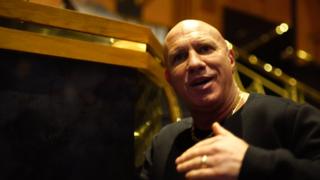
O’Donnell was originally a promoter for an MMA organisation called Cage Rage, featuring arguably one of MMA’s greatest ever fighters, Anderson Silva. After Cage Rage went bust, O’Donnell formed the UCMMA.
He believes the sport is riding a wave of excitement, sparked by the Ultimate Fighting Championship (UFC) in the US. A recent title fight, which saw one of the sport’s biggest stars – Irishman Conor McGregor – losing to Nate Diaz was watched by millions around the globe.
“There are more MMA gyms now in the UK than ever before. Gyms used to have a boxing ring, but now it’s a cage,” O’Donnell says.
O’Donnell, perhaps ambitiously, envisages a landscape in little over 10 years’ time where MMA is utterly dominant.
Mixed Martial Arts (MMA)
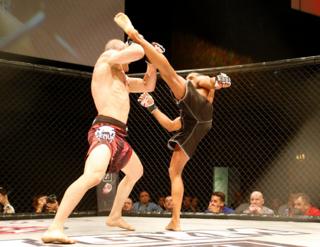 Image copyright Alamy
Image copyright Alamy - MMA combines techniques from different disciplines of martial arts – including muay thai, Brazilian jiu-jitsu, boxing, kickboxing and wrestling
- Critics have previously labelled the sport “human cockfighting”, a description organisers have been keen to evade by introducing greater regulation
- Fighters are split into different weight categories, and rounds last five minutes. Non-title matches must not exceed three rounds
- Fights can be won via knock-out, technical knock-out or through judges’ scoring
- The UFC (Ultimate Fighting Championship) is the largest pay-per-view provider in the world, broadcasting in 158 countries
- The sport’s rules are regulated by the IMMAF (International Mixed Martial Arts Federation)
For Graieri, it’s personal reasons – rather than the sport’s growing prestige – that brings him to compete in “the Octagon”, as the cage is known.
“I used to get beat up a lot as a kid, and I just felt afraid all the time. My mum was quite abusive… then when I went to school, I used to get beaten up.
“When I got older, I think it made me a bit of a weakling. I was always afraid, and I just hate feeling fear,” he says. “So if anything makes me feel fear, I just train myself to confront it.”
Graieri has overcome a severe back injury to take part in the event, having been unable to compete for the last two years.
But it has not dissuaded him from wanting to inflict pain on others. In fact, he revels in it.
“I think you’d have to like hurting someone [to fight], why else would you do it? If I’m on top of someone, punching someone in the face then that’s a good feeling isn’t it?”
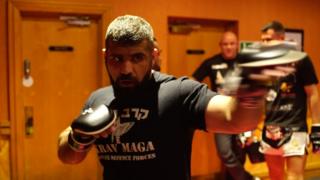
It’s a sentiment not many other combat sports competitors would admit to, and while he stands by his views, he seems disconcerted when it’s suggested he may be alone in voicing them.
Graieri becomes more distant in the lead-up to the fight. Most amateur cage fighters have trainers from the gyms they attend, and when Graieri’s joins him at the venue he is keen to focus solely on his preparations.
Back in the arena, seats are beginning to fill with nearly 2,000 fans keen for the action to commence.
As the fighters take the long, pre-fight walk to the cage the energy rises, peaking further as the bell sounds.
Graieri is competing in the third-to-last fight, some four hours after the night begins. It’s a long wait. As he finally enters the cage, he hits his head with his gloves in the hope of gaining focus.
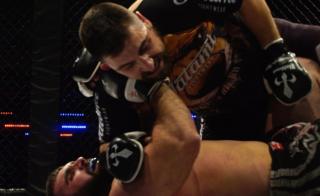
The bell rings, and after taking some big kicks, Graieri takes control – pinning his opponent to the floor.
After two minutes of fighting, he delivers what is known as the “ground and pound”, which involves him repeatedly punching his opponent in the face, and the referee stops the fight.
Miraculously, Graieri has won. “Just seeing my friends’ faces in the audience, seeing them smile – that’s what I’m most happy about,” he says after the fight. “They all think of me as the hard man, and I didn’t want to let them down. Hearing them cheer for me was special.”
As for his opponent: “He was actually a great guy, I spoke to him afterwards. I’m not looking forward to going back into the office with this black eye he gave me though.”
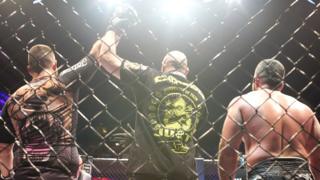
Graieri leaves to join his friends as the crowd’s cheers ring around the Troxy, and the headline fight begins.
Despite the negative headlines often given to MMA, it is easy to see how it appeals to many. Its defenders say the sport is safer than many assume and a lot more organised. It is cage fighting, but it is not bare-knuckle boxing.
To most fighters, it’s all about the pride and not about hurting an opponent.
Subscribe to the BBC News Magazine’s email newsletter to get articles sent to your inbox.
Read more: http://www.bbc.co.uk/news/magazine-35927669





